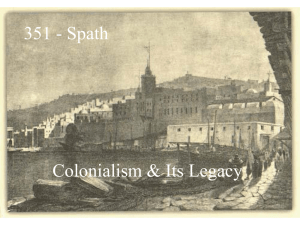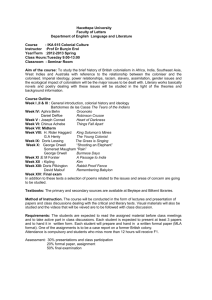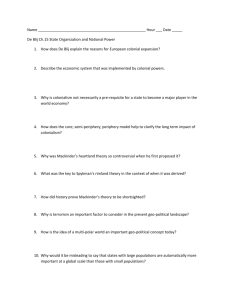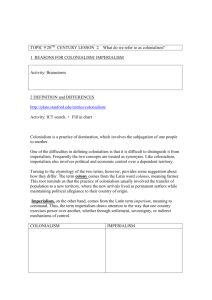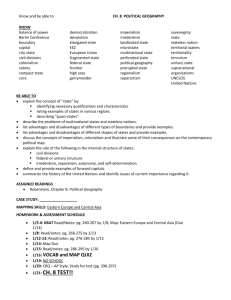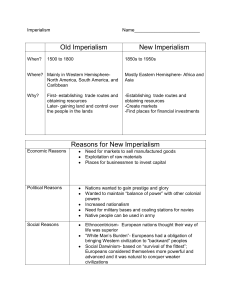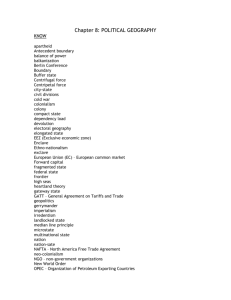The Practice and Legacy of Colonialism summary questions
advertisement
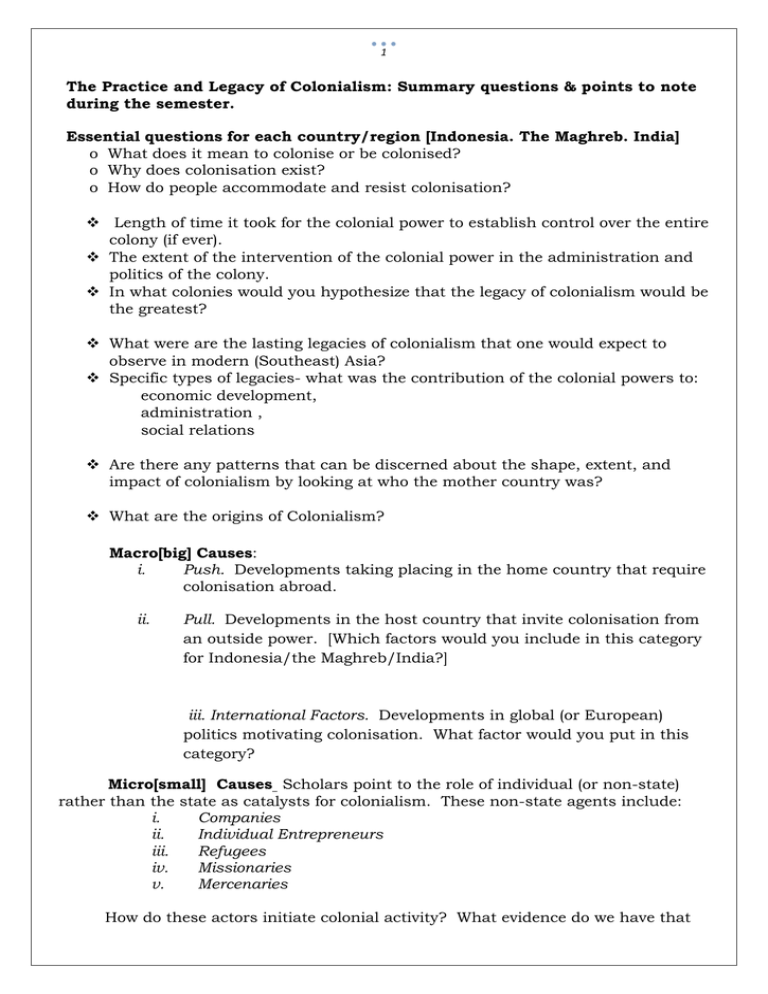
1 The Practice and Legacy of Colonialism: Summary questions & points to note during the semester. Essential questions for each country/region [Indonesia. The Maghreb. India] o What does it mean to colonise or be colonised? o Why does colonisation exist? o How do people accommodate and resist colonisation? Length of time it took for the colonial power to establish control over the entire colony (if ever). The extent of the intervention of the colonial power in the administration and politics of the colony. In what colonies would you hypothesize that the legacy of colonialism would be the greatest? What were are the lasting legacies of colonialism that one would expect to observe in modern (Southeast) Asia? Specific types of legacies- what was the contribution of the colonial powers to: economic development, administration , social relations Are there any patterns that can be discerned about the shape, extent, and impact of colonialism by looking at who the mother country was? What are the origins of Colonialism? Macro[big] Causes: i. Push. Developments taking placing in the home country that require colonisation abroad. ii. Pull. Developments in the host country that invite colonisation from an outside power. [Which factors would you include in this category for Indonesia/the Maghreb/India?] iii. International Factors. Developments in global (or European) politics motivating colonisation. What factor would you put in this category? Micro[small] Causes Scholars point to the role of individual (or non-state) rather than the state as catalysts for colonialism. These non-state agents include: i. Companies ii. Individual Entrepreneurs iii. Refugees iv. Missionaries v. Mercenaries How do these actors initiate colonial activity? What evidence do we have that 2 this took place in Southeast Asia? In the Maghreb? In India? Overall, which of the above fundamental paths do you find to be the most sound? Trade and the Flag. “To a considerable extent the usual colonial paradigm was reversed and the flag followed Trade into Malaya so that, as trade and commerce developed, Britain came first to achieve a political paramountcy [greatest in importance or significance] in the region and subsequently to build on that paramountcy to ensure direct political control of affairs.” How do you interpret this statement? Do you agree with the view expressed that in general political colonisation precedes economic dominance? How does this situation compare how does it compare to the Dutch colonisation of Indonesia? Indonesia- overseas Chinese encountered resentment from indigenous populations. What were the most important motivations for this resentment? What was the connection between local resentment and colonialism? Similar case in the Maghreb-keep a note of this when we talk about this situation. Colonialism is a practice of domination, which involves the subjugation of one people to another. The term colony comes from the Latin word colonus, meaning farmer. This root reminds us that the practice of colonialism usually involved the transfer of population to a new territory, where the arrivals lived as permanent settlers while maintaining political allegiance to their country of origin. Imperialism, on the other hand, comes from the Latin term imperium, meaning to command. Thus, the term imperialism draws attention to the way that one country exercises power over another, whether through settlement, sovereignty, or indirect mechanisms of control. In the nineteenth century, the tension between liberal thought and colonial practice became particularly acute, as dominion of Europe over the rest of the world reached its zenith. Ironically, in the same period when most political philosophers began to defend the principles of universalism and equality, the same individuals still defended the legitimacy of colonialism and imperialism. One way of reconciling those apparently opposed principles was the argument known as the “civilizing mission,” which suggested that a temporary period of political dependence or tutelage was necessary in order for “uncivilized” societies to advance to the point where they were capable of sustaining liberal institutions and self-government. Colonialism is not a modern phenomenon. World history is full of examples of one society gradually expanding by incorporating adjacent territory and settling its people on newly conquered territory…..Colonialism, then, is not restricted to a specific time or place…., thus the modern European colonial project emerged when it became possible to move large numbers of people across the ocean and to maintain political sovereignty in spite of geographical dispersion. Both colonialism and imperialism were forms of conquest that were expected to benefit Europe economically and strategically….The term imperialism often describes cases in which a foreign government administers a territory without significant settlement; typical examples include the scramble 3 for Africa in the late nineteenth century….Some scholars distinguish between colonies for settlement and colonies for economic exploitation. Others use the term colonialism to describe dependencies that are directly governed by a foreign nation and contrast this with imperialism, which involves indirect forms of domination. As Britain began to acquire overseas dependencies, the concept of empire was employed more frequently. Imperialism was understood as a system of military domination and sovereignty over territories. The day to day work of government might be exercised indirectly through local assemblies or indigenous rulers who paid tribute, but sovereignty rested with the British…..Thus, for Lenin and subsequent Marxists, imperialism described a historical stage of capitalism rather than a trans-historical practice of political and military domination. The lasting impact of the Marxist approach is apparent in contemporary debates about American imperialism, a term which usually means American economic hegemony, regardless of whether such power is exercised directly or indirectly. Natural Law and the Age of Discovery …..the framework of a religious discourse that legitimised military conquest as a way to facilitate the conversion and salvation of indigenous peoples. The idea of a “civilising mission” was by no means the invention of the British in the nineteenth century…. The idea that civilisation is the culmination of a process of historical development, however, proved useful in justifying imperialism. For example, according to John Stuart Mill savages do not have the capacity for self-government because of their excessive love of freedom. Serfs, slaves, and peasants in barbarous societies, on the other hand, may be so schooled in obedience that their capacity for rationality is stifled. Only commercial society produces the material and cultural conditions that enable individuals to realise their potential for freedom and self-government. According to this logic, civilised societies like Great Britain are acting in the interest of less-developed peoples by governing them. Imperialism, from this perspective, is not primarily a form of political domination and economic exploitation but rather a paternalistic practice of government that exports “civilization” (e.g. modernisation) in order to foster the improvement of native peoples. Despotic government is a means to the end of improvement and ultimately self-government. Margaret Kohn. http://plato.stanford.edu/entries/colonialism/
